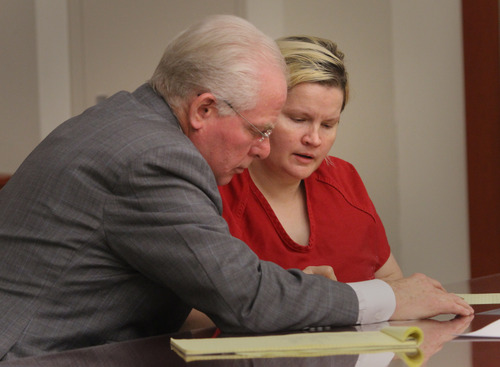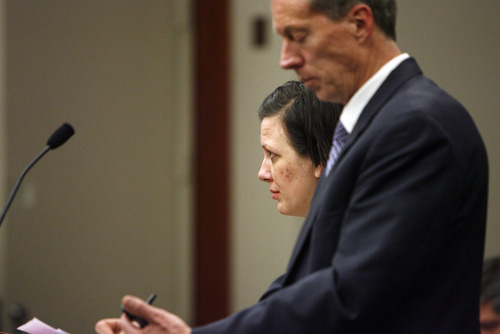This is an archived article that was published on sltrib.com in 2013, and information in the article may be outdated. It is provided only for personal research purposes and may not be reprinted.
If Utah doesn't start doing a better job of providing legal defense to poor people, local and national experts say, the state could have a lawsuit on its hands.
A state courts committee is searching for improvements while two groups that could sue the state keep watch.
The American Civil Liberties Union and the National Association for Criminal Defense Lawyers (NACDL) say such a lawsuit would allege that Utah has violated the U.S. Constitution because it fails to fund a public defender system, leaving too few attorneys for the thousands of poor defendants in Utah.
But no lawsuits are in the works — for now — as the state's Judicial Council, a policymaking body that oversees Utah's court system, explores what works and what doesn't in the state's patchwork system of indigent defense.
After gathering data on the problem, committee members said, they will address reform.
"We're actively monitoring the situation," said John Mejía, legal director for the ACLU of Utah. "But we're encouraged that the council has a committee looking into this issue."
Utah is one of only two states in the country that provides neither funding nor oversight to counties charged with organizing and implementing a system for defending poor people in criminal court.
What results is a "disastrously inconsistent system" that may take aggressive action to remedy, said Aric Cramer, who lives in Washington County and sits on the NACDL board of directors.
The Judicial Council's committee — composed of 25 lawmakers, lawyers, judges and experts — will begin to gather data from across the state as soon as June.
"We all agree there are problems, but there's no clear consent about exactly what those problems look like," said Assistant Courts Administrator Rick Schwermer, who sits on the committee. "We need data. We need information about what's really going on out there in the courtrooms, in the counties."
Enter the Sixth Amendment Center.
A nonprofit organization that specializes in evaluating how states handle the guarantee of counsel, the center was asked to help Utah gather data on its own public-defense problem.
Twenty-six states delegate that responsibility to counties. What makes Utah's case particularly difficult, said Sixth Amendment Center Director David Carroll, is that each county handles indigent defense in its own way without any statewide standards.
For instance, Salt Lake County's legal defenders, often heralded as the state's gold standard, specify the kind of experience lawyers must have before taking on murder cases; in other counties, all cases, from theft to murder charges, are given to whichever attorney makes the lowest contract bid.
Utah gives its counties what legal experts call an "unfunded mandate" to provide indigent defense. That means the state forces counties to provide lawyers for poor defendants but provides them neither money nor guidance to do so.
Each county's system varies, though most employ a system widely considered to be the least effective of them all: contract public defense.
In this model, private attorneys are awarded tax-funded county contracts to take on indigent clients. There is no limit to how many clients these attorneys will have to represent, and their rate is fixed, which creates a disincentive for attorneys to do extra work that may cost money from their own pockets.
"I think county officials and local government officials really do want to do what's right and follow the Constitution," said Kent Hart, executive director of the Utah Association of Criminal Defense who also serves on the Judicial Council's committee. "However, because most of them are not attorneys and most of them do not understand the court process, they lack understanding of what is needed to provide an adequate defense."
Because investigating all 29 of Utah's counties would be difficult and time-consuming, the center's team will only tackle 10. The list of which counties the study focuses on will be finalized at the Judicial Council committee's next meeting on April 15.
The study will attempt to answer several questions that affect the quality of indigent defense: Are the attorneys assigned to represent the poor qualified to handle the cases they're given? How many cases are public defenders forced to juggle at the same time? How much money do they have to work with? Are public defenders able to operate independent from the influence of politicians, judges and prosecutors?
Researchers will do this, Carroll said, by conducting interviews, sitting in on court hearings and examining how public defenders are treated, paid and appointed.
That's the easy part.
The hard part will be persuading governments — county or state — to spend money on a problem many do not understand or see as necessary.
"You're not constitutionally required to have the best sewer system," Hart said. "But you are required to fund and provide an adequate defense for indigent persons. This is not just a run-of-the-mill budget item."
"Constitutional mandates aren't always sexy," Cramer added. "So we need to make it sexy. We need to say there are abuses out there. What if it happened to you or someone you love? What if something went wrong? You would want the best possible defense, even if you couldn't afford it."
As many as 80 percent of criminal defendants nationwide require public representation, according to the National Legal Aid and Defenders Association.
Creating a statewide public defender commission may not be the only option, Carroll said.
Counties could elect public defenders in the same way judges are elected, which would thereby make the attorneys charged with representing the poor answerable to the public, he said. Other options include instituting local or regional boards or engaging the Utah Bar Association in providing oversight.
"There's no cookie-cutter model that you can pull off the shelf and instantly make things work," Carroll said. "The people of Utah need to work with us to help decide what's best for them."
If all goes according to plan, the committee will issue its findings and recommendations by June 2014.
But no matter what the state does, Carroll said, they'll need to believe in it.
"Systems tend to grow and flourish because people believe in these standards, in having an accountable, well-qualified system," he said. "Not because states just want to avoid a lawsuit with the ACLU."
mlang@sltrib.com Twitter: marissa_jae





